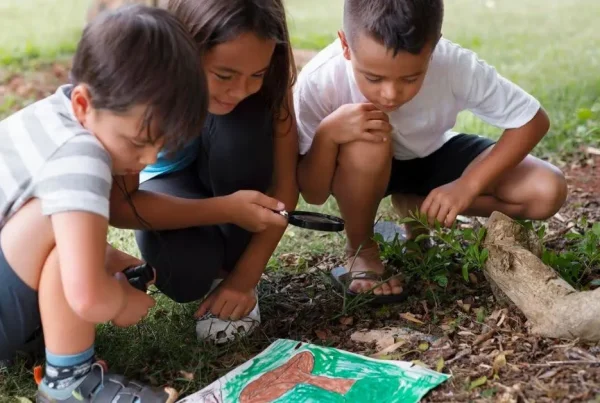When parents consider extracurricular activities, the choices can feel endless: sports, music lessons, coding clubs, community service, and more. With so many options, it’s natural to wonder: Which ones will truly benefit my child?
Choosing wisely matters because extracurriculars can shape character, develop skills, and help children discover passions that may stay with them for life.
As Christian parents, we are called to practice good stewardship of our children’s time and God-given talents.
Read also: 7 Productive Free Time Activities for Kids and Teens
Helping them engage in activities that nurture their gifts while balancing rest and family time is part of guiding them toward growth in both faith and character (1 Peter 4:10).
Here’s a guide to age-appropriate extracurricular activities to help you make thoughtful choices at every stage of your child’s journey.
Why Extracurricular Activities Matter
Extracurriculars play a crucial role in a child’s holistic development, shaping their skills and also their character.
When children participate in structured activities, they learn to manage their time and develop self-discipline, while the challenges they encounter help them grow in confidence.
These experiences often encourage teamwork, leadership, and responsibility, equipping them with valuable life skills that extend far beyond the classroom.
At the same time, extracurriculars provide opportunities for children to discover passions that may influence future careers or become lifelong hobbies.
Just as importantly, the ups and downs of participation nurture resilience, teaching children to persevere through both success and failure.
Beyond all these benefits, extracurricular activities also create meaningful spaces for learning virtues such as patience, humility, perseverance, and service; qualities that echo biblical principles and reflect the values of living faithfully with the gifts God has entrusted to them.
How to Choose the Right Extracurricular?
Choosing the right extracurricular activity isn’t one-size-fits-all—it should grow with a child’s stage of development and character.
The best opportunities meet children where they are, nurturing curiosity in the early years and gradually building discipline, identity, and purpose as they mature.
1. Kindergarten (Ages 3–6): Exploring the World Through Play
At this age, children are naturally curious and eager to explore new interests. When parents wonder how to choose extracurricular activities, the goal is joyful discovery rather than mastery.
The best extracurricular activities focus on movement, creativity, and simple skill-building. Activities like dance, swimming, martial arts, or beginner music classes let them move, explore interests, and build coordination.
Parents can also consider creative clubs, such as a small art or drama club designed for early childhood learners.
Families can gently guide children to try different activities without pressure, helping them begin to develop confidence and curiosity that support lifelong personal growth.
As Proverbs 22:6 reminds us, “Start children off on the way they should go, and even when they are old they will not turn from it.”
2. Primary (Ages 6–12): Building Foundations
As kids enter primary school, they start to focus and show a deeper commitment.
This is a great stage to let them sample various extracurricular activities, such as team sports, a beginner science club, or simple academic clubs that nurture discipline and teamwork.
Creative options like a children’s drama club or performing arts classes help build confidence and strengthen communication skills.
Parents can encourage participation to see what excites their child while gently guiding them toward activities that foster character and resilience.
Helping them handle both success and disappointment teaches valuable skills for long-term academic success and a positive impact on the local community.
3. Middle School (Ages 12–15): Developing Identity and Responsibility
Middle school is a formative season when students begin to shape their identity and step into leadership roles.
During these years, extracurricular activities such as student government, robotics or science club, and debate teams give them space to pursue passion projects, build time-management habits, and develop leadership skills that prepare them for life beyond the classroom.
Read also: How to Help Your Child Find Their Passion and Calling During Their Teenage Years
As they explore new interests and gain valuable skills, it’s equally important to teach balance. Parents can guide their children to see that managing school, activities, and rest requires self-discipline and wisdom (Proverbs 16:32).
Because middle-schoolers often face peer pressure or moments of self-doubt, encourage participation in activities that affirm their God-given identity and reinforce their worth in Christ.
As Galatians 6:9 reminds us, “Let us not become weary in doing good, for at the proper time we will reap a harvest if we do not give up.”
4. High School (Ages 15–18): Preparing for the Future
By high school, selecting the right extracurricular activities becomes an important step toward both future career goals and the college admissions process.
High school students who show long-term commitment to meaningful clubs stand out to college admissions officers and an admissions committee, demonstrating reliability and dedication.
Strong options include the school newspaper, math club, physics club, National Beta Club, or other specialized academic clubs.
Participation in these activities highlights significant achievements, provides leadership opportunities, and allows teens to serve their community through community service or student government.
Internships, advanced performing arts programs, and additional community service projects can further show admissions officers that a student is ready to make a positive impact beyond the regular curriculum.
These experiences not only strengthen a college application but also nurture leadership skills, encourage personal growth, and help teens discover potential career paths.
Parents can guide their teens in making wise choices by asking together, “Does this activity help me glorify God, serve my community, and grow as a person?” As 1 Peter 4:10 reminds us, “Each of you should use whatever gift you have received to serve others, as faithful stewards of God’s grace in its various forms.”
 How Parents Can Tell If an Extracurricular Is the Right Fit? Signs It’s Time to Reevaluate
How Parents Can Tell If an Extracurricular Is the Right Fit? Signs It’s Time to Reevaluate
Children’s interests change as they grow, so an activity that once fit well may need to be reconsidered.
These points will help you see when an activity continues to help a child grow and when it may be time to look for something new while still valuing long-term commitment.
1. Your Child Stays Interested and Continues to Learn
A good fit keeps a child curious and challenged. Notice whether they look forward to practice or meetings and still gain new skills.
If enthusiasm fades or the activity feels too easy, it may be time to explore other interests, such as trying a new sport or joining a hiking club, so they stay motivated and engaged.
2. Opportunities to Take on Responsibility
The right activity allows a child to grow into leadership roles over time. Watch for chances to plan, mentor, or guide peers.
If a team or class rarely offers these opportunities, it might not fully support their growth. Activities that share responsibility help children build confidence and skills for college and future careers.
3. Healthy Balance with School and Family
An extracurricular fits well when it blends smoothly with schoolwork and home life. If your child manages homework, rest, and club commitments without constant stress, that is also a good sign.
If the schedule starts to feel overwhelming, consider adjusting the number of activities so they can maintain a balanced routine.
4. Positive Impact and Personal Growth
The right activity helps a child feel proud of their contribution and see how their efforts make a difference.
Look for activities that inspire them, build character, and connect to possible future goals. When an activity nurtures both personal growth and community involvement, it shows that the fit is strong.
A Balanced Path Forward: Partner with SPH in Your Child’s Growth
The right extracurricular activities enrich a child’s life, but so does downtime, family time, and space to grow spiritually.
As parents, we can prayerfully guide our children to choose activities that nurture their talents, align with their values, and equip them to use their gifts to glorify God.
Ultimately, extracurricular choices should reflect not just skills or achievements but values and purpose.
Read also: Why Choose International Schools? 7 Top Reasons Parents Should Know
When guided with love, prayer, and wisdom, these activities become more than pastimes. They become stepping stones toward a life of faith, service, and flourishing.
Across our campuses at Sekolah Pelita Harapan, including our International High School in Jakarta, students are encouraged to explore passions through extracurriculars designed to complement academics while fostering character, leadership, and faith.
Our Discovery Academy offers additional opportunities for students to explore creative interests, gain new skills, and grow in confidence outside the regular classroom.
Partnering with families, we aim to help every child grow into the person God has called them to be.
If you are looking for a Christ-centered International High School in Jakarta or a dynamic enrichment program like Discovery Academy, we invite you to contact SPH for more information or to begin the enrollment process!








